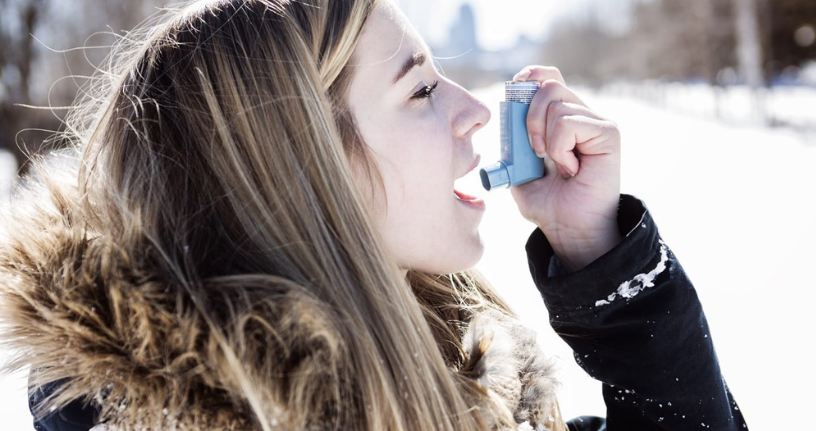Protecting your lungs during winter is important, especially as cold air, dry conditions, and indoor pollutants can exacerbate respiratory issues. While medications and treatments are vital for those with existing lung conditions, several natural approaches can help protect and support lung health during the winter.
Cold weather can be particularly challenging for people with asthma. The winter air is dry, cold, and can irritate the airways, leading to asthma flare-ups or exacerbating asthma symptoms. However, with the right precautions, it is possible to reduce the impact of cold weather on your asthma and protect your lungs. Following natural ways does not mean you leave, skip, reduce, or change your asthma treatment schedule or medicines.
Some natural ways to protect your lungs in winter include:
- Keep your airway warm
-
- Cover your mouth and nose – When going outdoors, wear a scarf, face mask, or balaclava to cover your mouth and nose. This helps warm and humidify the air before it enters your lungs, preventing irritation and minimizing asthma symptoms.
- Breathe through your nose – Try to breathe through your nose instead of your mouth. This allows the air to be filtered, warmed, and moistened before reaching your lungs.
- Maintain a healthy indoor environment
-
- Humidify the air – Use a humidifier to add moisture to the dry winter air inside your home. Dry air can aggravate asthma, so keeping the air at a comfortable humidity level can help prevent irritation.
- Avoid smoke and pollutants – Avoid exposure to secondhand smoke, strong perfumes, or harsh cleaning products, as these can trigger asthma symptoms. Ensure proper ventilation when cooking or using a fireplace.
- Control allergens – In winter, indoor allergens such as dust mites, mold, and pet dander can become more concentrated. Regularly clean your home, wash bedding in hot water, and use air purifiers to reduce indoor allergens.
- Monitor your asthma symptoms
-
- Keep an asthma action plan – Work with your doctor to create or review your asthma action plan. This plan will help you manage your asthma in different situations, including cold weather. Make sure you know what medications to take and when.
- Use your inhaler as prescribed – If you use a preventer inhaler, take it regularly, even when you feel fine. Keep your reliever inhaler with you in case of sudden symptoms, such as wheezing or shortness of breath.
- Limit outdoor activity on extremely cold days
-
- Choose indoor exercise – If possible, exercise indoors during extremely cold days. Cold air can trigger asthma attacks, especially when you are active and breathing heavily. Activities like swimming in a heated pool or indoor walking can be good alternatives.
- Warm up before outdoor activities – If you must exercise outdoors, slowly warm up indoors beforehand. Gradually increase your activity level to allow your body to adjust to the cold.
- Stay up to date with vaccinations
-
- Get the flu vaccine – Respiratory infections like the flu can worsen asthma symptoms. Getting the flu vaccine each year helps protect against viral infections that could trigger asthma flare-ups.
- Pneumonia vaccine – Talk to your doctor about whether the pneumonia vaccine is right for you, especially if you have chronic asthma, to reduce the risk of serious respiratory infections.
- Dress in layers
Wear warm, breathable clothing. Dress in layers to stay warm, but ensure your clothing is breathable. Avoid tight, restrictive clothing that can interfere with your ability to breathe easily.
- Check the air quality
Monitor pollution levels; in winter, some areas may experience higher pollution levels due to increased heating and traffic. Check local air quality reports and try to stay indoors if pollution levels are high. Poor air quality can exacerbate asthma symptoms.
- Keep emergency medications close
Always carry your reliever inhaler (bronchodilator) with you in case of an asthma attack.By implementing these strategies, you can better manage your asthma during the colder months and reduce the risk of flare-ups. If you experience more frequent or severe signs of asthma or asthma symptoms during the winter, consult your doctor to adjust your asthma management plan. Some of the common and best medicines for asthma include theo asthalin forte 4mg, budecort respules 0.5mg per 2ml, asthalin HFA inhaler 100 mcg, asthalin respules 2.5 ml, seretide diskus 250 mcg / 50 mcg, theo asthalin forte 4mg, foracort inhaler 6/200 mcg (120 MDI), and few more to name. Using prescribed asthma medicine is crucial to keep your health good.
Some general tips and strategies to keep lungs healthy during winter include:
- Humidify the air
-
- Use a humidifier – Dry air can irritate the airways, so using a humidifier in your home helps to add moisture to the air and prevent your lungs from drying out. This is particularly useful in heated indoor environments, which can be very dry during winter.
- Natural humidity sources – You can also place a bowl of water near a radiator or on a windowsill to help increase indoor humidity naturally.
- Breathe steam
-
- Steam inhalation – Breathing in steam helps to open the airways, relieve congestion, and moisturize the airways. You can do this by inhaling steam from a hot water bowl or by taking a warm shower. Adding essential oils like eucalyptus or peppermint can help clear the sinuses and ease breathing.
- Herbal teas – Drinking warm herbal teas like ginger, chamomile, or peppermint has soothing effects and can help keep your respiratory system moist.
- Stay active
-
- Gentle exercise – While extreme cold may discourage outdoor exercise, light activities like walking indoors or doing yoga can help keep your lungs healthy. Physical activity encourages deeper breathing, which helps clear the lungs and enhances circulation.
- Breathing exercises – Techniques like diaphragmatic or pursed-lip breathing can help strengthen lung capacity and improve airflow, reducing stress on your respiratory system.
- Maintain a healthy diet
-
- Antioxidant-rich foods – Eating a diet rich in fruits and vegetables provides antioxidants that can help protect your lungs from inflammation and damage. Focus on foods high in vitamin C (e.g., citrus fruits, bell peppers), vitamin E (e.g., nuts, seeds, leafy greens), and beta-carotene (e.g., carrots, sweet potatoes).
- Omega-3 fatty acids – Foods like fatty fish (salmon, mackerel), walnuts, and flaxseeds contain omega-3 fatty acids that help reduce inflammation in the body and support lung health.
- Stay hydrated – Drinking enough water keeps your mucous membranes hydrated and helps to thin mucus, making it easier to clear out of your lungs.
- Avoid smoking and secondhand smoke
-
- Quit smoking – Smoking is extremely harmful to your lungs and can worsen any respiratory condition, including asthma and bronchitis. Quitting smoking can significantly improve lung function.
- Avoid secondhand smoke – Ensure you are not exposed to secondhand smoke, which can be just as harmful to your lungs. Stay away from areas where people smoke, especially indoors.
- Use herbal remedies
-
- Herbal expectorants – Certain herbs support lung health and act as natural expectorants to help clear mucus from the airways. These include thyme, eucalyptus, ginger, and licorice root.
- Eucalyptus oil – Inhaling eucalyptus oil (either through steam inhalation or a diffuser) can help open the airways and relieve congestion. It also has anti-inflammatory properties that can soothe irritated lungs.
- Honey and lemon – A warm drink of honey and lemon can soothe the throat and help with dry or irritated airways, especially during cold weather.
- Protect yourself from cold air
-
- Cover your mouth and nose – When you need to go outside in cold weather, try covering your mouth and nose with a scarf or mask to warm and humidify the air before it enters your lungs. This reduces the risk of triggering asthma or other respiratory issues from the cold air.
- Breathe through your nose – Breathing through your nose rather than your mouth helps to filter, warm, and humidify the air, making it less likely to irritate your lungs.
- Practice good hygiene
-
- Wash your hands frequently – Winter months bring an increase in colds, flu, and respiratory infections. Wash your hands regularly to reduce the risk of catching illnesses that can affect your lungs.
- Avoid sick people – Try to stay away from individuals who are sick, as respiratory infections can make your lungs more vulnerable to illness during the winter months.
- Use natural decongestants
-
- Saltwater gargles – Gargling with warm salt water can help soothe a sore throat and clear out mucus from the airways.
- Neti pot – A neti pot, used to rinse the nasal passages with a saline solution, can help relieve congestion and keep the airways clear.
- Limit exposure to air pollution
-
- Check air quality – Winter months can increase air pollution due to heating systems and vehicle emissions. Keep an eye on air quality reports and avoid outdoor activities if pollution levels are high.
- Air purifiers – Use an air purifier in your home, especially if you live in an area with poor air quality. These devices can filter out allergens and pollutants that might affect your lungs.
Incorporating these natural strategies into your routine can help keep your lungs healthy and protected from the harsh winter environment. However, consulting a doctor is necessary if you have respiratory concerns; he can provide personalized advice and treatment considering your health condition. Follow the prescribed treatment to avoid unwanted health complications. Don’t hesitate to speak to your doctor if you have concerns about following the regimen or natural remedies.




